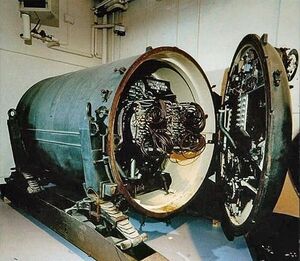Blue Peacock (nonfiction): Difference between revisions
No edit summary |
No edit summary |
||
| Line 1: | Line 1: | ||
'''Blue Peacock''', renamed from Blue Bunny and originally Brown Bunny, was a British tactical nuclear weapon project in the 1950s. | [[File:Blue_Peacock_nuclear_mine.jpg|thumb|Blue Peacock nuclear mine.]]'''Blue Peacock''', renamed from Blue Bunny and originally Brown Bunny, was a British tactical nuclear weapon project in the 1950s. | ||
The project's goal was to store a number of ten-kiloton nuclear mines in Germany, to be placed on the North German Plain and, in the event of Soviet invasion from the east, detonated by wire or an eight-day timer. | The project's goal was to store a number of ten-kiloton nuclear mines in Germany, to be placed on the North German Plain and, in the event of Soviet invasion from the east, detonated by wire or an eight-day timer. | ||
| Line 7: | Line 7: | ||
== In the News == | == In the News == | ||
<gallery | <gallery> | ||
</gallery> | </gallery> | ||
Revision as of 11:54, 24 August 2018
Blue Peacock, renamed from Blue Bunny and originally Brown Bunny, was a British tactical nuclear weapon project in the 1950s.
The project's goal was to store a number of ten-kiloton nuclear mines in Germany, to be placed on the North German Plain and, in the event of Soviet invasion from the east, detonated by wire or an eight-day timer.
One technical problem was that during winter buried objects can get very cold, and it was possible the mine's electronics would get too cold to work after some days underground. Various methods to get around this were studied, such as wrapping the bombs in insulating blankets. One particularly remarkable proposal suggested that live chickens be included in the mechanism. The chickens would be sealed inside the casing, with a supply of food and water; they would remain alive for a week or so; their body heat would keep the mine's components at a working temperature.
In the News
Fiction cross-reference
Nonfiction cross-reference
External links:
- Blue Peacock @ Wikipedia
